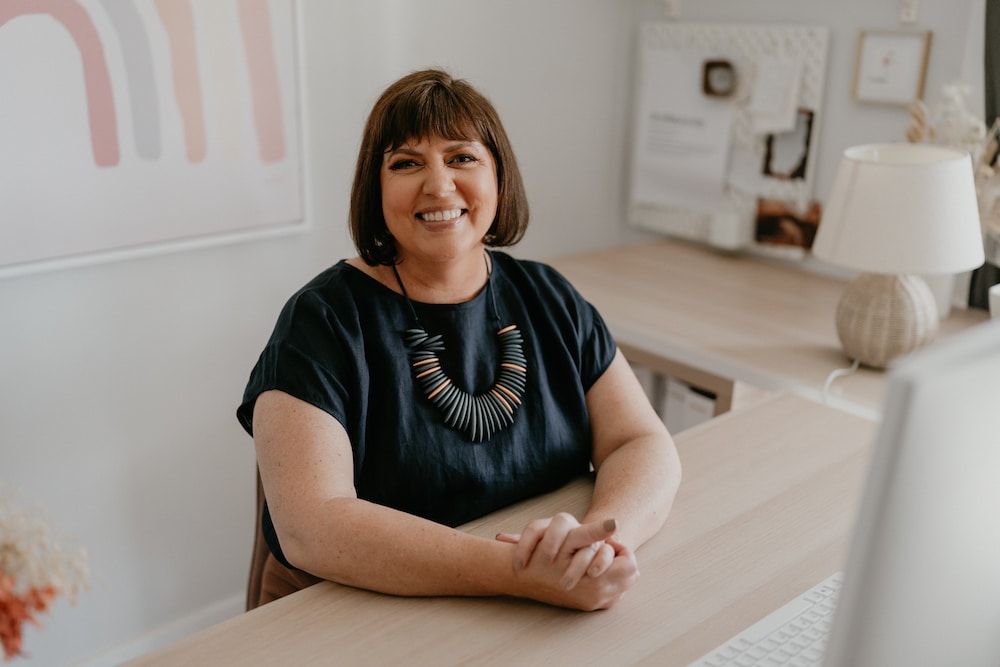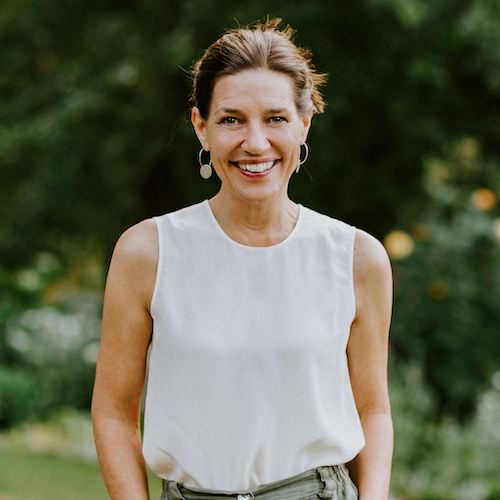
Dr Rebecca Ray (who prefers to be known as Beck) is a clinical psychologist, author, podcast host and speaker. She’s also mother to Bennett, wife of Nyssa and until recently, pet parent to three dogs (sadly, she recently lost her beloved 13-year-old, Weimaraner, Henry). Beck and her family live in one of my favourite parts of the world, the beautiful hinterland on the Sunshine Coast.
Beck has written six brilliant books on how to be happier, how to practise self-kindness, how to be brave, how small habits can help us create big change and how to set boundaries. Her most recent title, only just released, is Difficult People.
She’s the creator of some wonderful online programs, Radical Courage, Radical Abundance and Overcoming Self-Sabotage and she’s about to host an online retreat with tips about how to be published.
Beck and I are lucky enough to share the same publisher – the wonderful Ingrid Ohlsson at Pan Macmillan – and we also share many of the same philosophies on what makes a good life.
She and I had a delightful chat on Zoom recently and she kindly agreed to be a guest on the blog. I hope you enjoy our conversation.

Can you tell us a little bit about yourself and your work?
I’ve been a clinical psychologist for 20 years. I seem to have unintentionally become an expert in pivoting in that time, though! I became a commercially licensed pilot while I was studying psychology, who had eyes on flying for a major airline for a time. After properly acknowledging my life non-negotiables of routine and working with skills that come naturally to me (words rather than maths and physics), I walked away from my wings and into private practice.
I loved private practice work and spent years working with remarkably brave clients. I specialised in treating trauma and built up a significant client base of police and emergency services personnel and military veterans and current serving defence personnel.
I thought I’d be in private practice until I was 70. Unfortunately, burnout snuck up on me over the course of a few years. My attempts to stave it off and ‘fix’ my energy levels turned out to be band-aids. In the end, burnout made the decision for me, and I was forced to find a way to rebuild my career doing what I love (psychology) but in an entirely different way.
I toyed with the idea of translating all the therapeutic skills I taught clients and offering them to a wider audience via social media. It was especially anxiety-provoking because I didn’t even have a Facebook profile at the time. Over the last few years, that has developed into books, audiobooks, speaking events, podcasts, mentoring, courses, and media appearances.
I didn’t ever expert my work to look like this, but it’s more fulfilling than ever!
Your latest book is Difficult People. I’d love to start by asking you, do you have any quick tips to help us understand how we can tell the difference between a difficult person and someone who is just having a bad day?
You can tell the difference by what you know about this person. Are they acting in a way that’s out of character? Do you know that something is going on for them which is particularly stressful? After they realise their behaviour is ineffective or hurtful, do they seek to repair with you?
Difficult people, on the other hand, tend to be consistently difficult over time. They may even be so consistent that you can predict what they will do to cause problems for you before they actually do it. They also commonly lack insight into their behaviour. If they do have some awareness, they generally have low willingness to change because they are motivated to continue gaining an advantage over you.

In the book you name some different types of difficult people, which I found hugely helpful. Can you share a few of those types with us?
Sure.
There’s The Plasticine, who takes people-pleasing to the extreme, leaving you to feel like you never know what they want or need, and leaving them to eventually erupt in anger because they have been overlooked one too many times (even though their neglect has been self-created).
There’s The Narcissist, who perpetually believes they are superior than others and therefore, owed benefits and special treatment that recognises their superiority. They tend to charm others as long as they are gaining advantage, and then drop them as soon as that person has served their purpose.
There’s The Brick Wall, who shuts down at the first sign of vulnerability and will be the first to cut off a relationship or ghost someone when things get hard. The Brick Wall refuses connection based on the belief that emotional closeness is risky.
There are six others that I don’t have space for here, but all of them behave in difficult ways as a result of their ineffective interpersonal coping strategies
Do you have one or two quick tips for how we begin to deal with the difficult people in our lives? (other than reading the book which we’ll all do!).
- Set boundaries and communicate them. Boundaries don’t exits unless the other person knows about the boundary in the first place.
- If the boundary is not respected (typical, when dealing with a difficult person), remember that as an adult, you get to choose which other adults who get to have ongoing access to you. If someone is emotionally or psychologically unsafe for you in an ongoing way and shows no sign of changing, you get to decide to remove their access to you.
- Focus on the people around you who are good for your mental health. It can’t be said enough that the people who are good for our souls are healing to be around.
As well as being a mum to five-year-old Bennett, you’re a speaker, a mentor and an author. How do you manage the juggle?
I don’t always manage it well. But one of my non-negotiables is to ensure that I have a LOT of quite time after periods where my energy has been used up extroverting. Honouring my energy with self-compassion and self-kindness has been the key for me when it comes to asking myself to do hard things to expand my comfort zone.

What are you reading / listening to / cooking at the moment?
For the second time, I am reading Breaking the Habit of Being Yourself by Joe Dispenza
I am listening to the same thing because I read via audiobooks
I don’t cook but I am huge fan of poached chicken and vegetable broth from my favourite local café
What’s one piece of advice you would offer your twenty-year-old self?
I’d remind her that she doesn’t need to be fixed because she’s magical the way she is. And I’d tell her that it’s going to be better than she can even imagine.
What’s one (or more) change you hope to make in the world through your work?
I hope that all my work reminds people that their superpower is often the parts of themselves they see as imperfect. That in embracing their whole selves, they can expand to create a life that’s entirely on their own terms and authentic to their hopes ands dreams.

